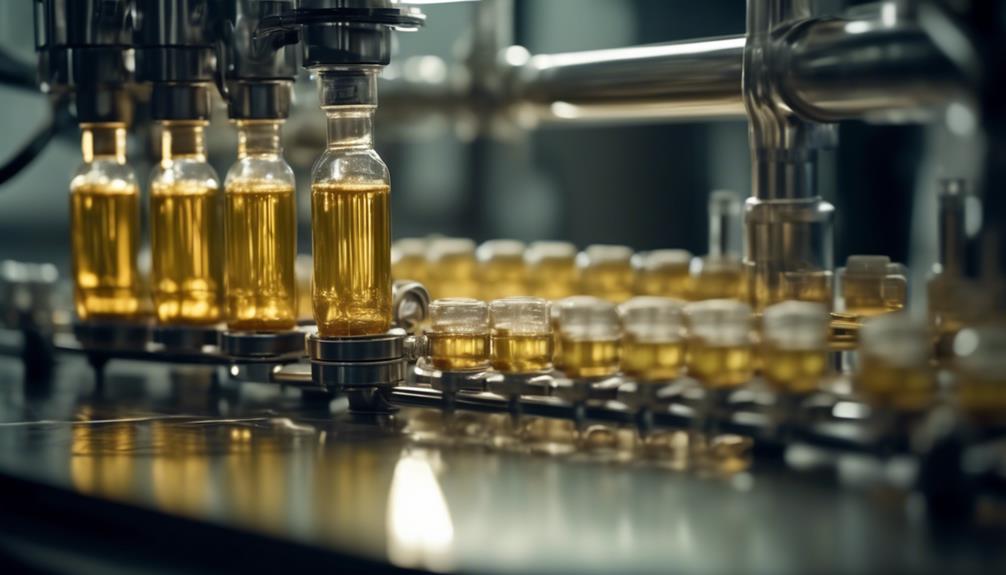
Ever wondered how emu oil, that elixir of skincare, is meticulously extracted and refined to ensure its top-tier quality? Allow me to enlighten you on the fascinating process.
First, the emu oil extraction commences, where the precious oil is carefully obtained from the fat of the emu bird.
Then, through a series of emulsification and centrifugation steps, impurities are separated, allowing the pure oil to rise to the surface.
But that's not all – filtration and purification steps follow, further refining the oil to remove any remaining particles and enhance its overall quality.
Curiosity piqued? Well, there's still more to uncover, such as the deodorization and sterilization processes, as well as the meticulous quality testing and packaging protocols.
So, prepare to embark on a journey of discovery as we unravel the intricate steps that go into creating high-quality emu oil.
Emu Oil Extraction

To extract emu oil, the emu fat is first rendered through a process of heating and separating the oil from other components. Emu oil extraction involves several steps that require precise emulsification techniques to ensure the highest quality oil is obtained. Emulsification is the process of mixing two immiscible substances, such as oil and water, to form a stable mixture. In the case of emu oil extraction, it involves breaking down the fat globules into smaller droplets, allowing the oil to separate more easily.
Once the emu fat is rendered, it undergoes a series of heating and cooling cycles to facilitate the separation of the oil. This process helps to remove impurities and unwanted components, leaving behind a pure and highly concentrated oil.
The benefits of emu oil are numerous and well-documented. It's known for its anti-inflammatory properties, making it an effective treatment for various skin conditions, such as eczema and psoriasis. Emu oil also helps to moisturize and hydrate the skin, promoting a smoother and healthier complexion.
Emulsification and Centrifugation
Emulsification and centrifugation play crucial roles in the extraction and refinement of emu oil, ensuring the separation of oil from other components and achieving the highest quality end product.
Emulsification techniques are employed to create a stable emulsion, where the oil droplets are dispersed evenly in a water-based solution. This process involves the addition of an emulsifying agent, such as a surfactant, which helps to reduce the interfacial tension between oil and water. The emulsification step is essential as it aids in breaking down the emu oil into smaller droplets, making it easier to separate from impurities.
Centrifugation, on the other hand, is a process that utilizes centrifugal force to separate the emulsion into its individual components. The emulsion is placed in a centrifuge, which spins rapidly, causing the heavier components, such as water and impurities, to settle at the bottom while the lighter emu oil rises to the top. This efficient separation process ensures that the emu oil is free from unwanted substances, resulting in a higher quality end product.
To maximize centrifugation efficiency, careful consideration is given to factors such as rotor speed, temperature, and duration of the centrifugation process. By optimizing these parameters, a greater degree of separation can be achieved, leading to a purer and more concentrated emu oil.
Emulsification and centrifugation are vital steps in the extraction and refinement of emu oil, ensuring that the final product meets the highest standards of quality and purity.
Filtration and Purification

Following the emulsification and centrifugation process, the next crucial step in the extraction and refinement of emu oil is filtration and purification. Filtration techniques are employed to remove impurities and unwanted substances from the oil, ensuring its purity and quality.
The first filtration step involves passing the emu oil through a series of filter papers or membranes with varying pore sizes. This process effectively removes larger particles, such as dirt, debris, and microbes, from the oil. Additionally, activated carbon filtration is often employed to remove any remaining impurities and odor-causing compounds.
Purification methods are then implemented to further refine the emu oil. One common purification technique is molecular distillation, which involves heating the oil under vacuum conditions. This process removes any volatile substances, such as fatty acids and contaminants, that have lower boiling points than the oil itself. Molecular distillation helps to enhance the overall purity and stability of the emu oil.
Throughout the filtration and purification process, it's crucial to maintain strict control over temperature, pressure, and filtration rates to ensure optimal results. By employing these filtration techniques and purification methods, the emu oil can be purified to meet the highest industry standards, resulting in a high-quality and desirable product for consumers.
Deodorization and Sterilization
Deodorization and sterilization are essential steps in the final refinement of emu oil, ensuring its purity and eliminating any unwanted odors or microbial contaminants. To achieve these goals, various deodorization techniques and sterilization methods are employed.
Deodorization techniques involve the removal of volatile compounds that contribute to unpleasant odors. One commonly used method is steam distillation, where steam is passed through the emu oil to carry away the volatile compounds. Another technique is vacuum distillation, which utilizes reduced pressure to lower the boiling point of the volatile compounds, allowing them to be separated more easily.
Sterilization methods are employed to eliminate microbial contaminants and ensure the safety of the final product. Heat treatment, such as pasteurization or autoclaving, is commonly used to kill bacteria, viruses, and other microorganisms. Filtration is also an effective method to remove any remaining particles or microorganisms from the emu oil.
It is important to note that the deodorization and sterilization processes should be carefully controlled to avoid any negative impact on the quality of the emu oil. The temperature, pressure, and duration of these processes must be optimized to achieve the desired results without causing any degradation or alteration of the oil's beneficial properties.
Quality Testing and Packaging

To ensure the highest quality and safety of the final product, the emu oil undergoes rigorous quality testing and is carefully packaged. Testing methods play a crucial role in determining the purity, potency, and overall quality of the emu oil. Various analytical techniques are employed to evaluate the oil's chemical composition and to ensure it meets industry standards. These methods include gas chromatography, high-performance liquid chromatography, and mass spectrometry.
Gas chromatography is used to separate and quantify the different components of the oil, while liquid chromatography helps identify and quantify specific compounds. Mass spectrometry provides valuable information about the molecular structure and purity of the oil. These testing methods allow for the identification of any potential contaminants or impurities, ensuring that the emu oil meets the highest quality standards.
Once the emu oil has undergone thorough quality testing, it's carefully packaged to maintain its integrity and freshness. Eco-friendly packaging materials are used to minimize the environmental impact and ensure the sustainability of the product. Recyclable and biodegradable materials are favored, such as glass bottles and cardboard boxes. These materials not only protect the emu oil from external factors but also reflect the commitment to environmental consciousness.
Additionally, the packaging is designed to prevent any leakage or contamination during transportation and storage, further ensuring the quality and safety of the final product. By adhering to strict quality testing methods and utilizing eco-friendly packaging, the emu oil can be trusted to deliver the highest quality and purity to consumers.
Frequently Asked Questions
Can Emu Oil Be Used for Cooking or Consumed Orally?
You can cook with emu oil and consume it orally for its health benefits. It's a versatile ingredient that adds flavor to your dishes and promotes overall well-being when ingested.
Are There Any Potential Side Effects or Allergic Reactions to Using Emu Oil Topically?
Using emu oil topically may have potential long term effects and can cause allergic reactions. Research on emu oil allergies is ongoing, so it is important to be cautious and consult a healthcare professional if any adverse reactions occur.
How Long Does the Entire Process of Extracting and Refining Emu Oil Typically Take?
The extraction and refining of emu oil can take varying amounts of time, depending on factors such as the method used and the desired quality. The extraction process directly affects the quality of the oil, making it crucial to choose the right method.
Are There Any Specific Storage Requirements for Emu Oil to Maintain Its Quality and Efficacy?
To ensure the quality and efficacy of emu oil, follow specific storage requirements. Properly store it in a cool, dark place away from sunlight and heat. Maintain its potency by sealing it tightly and using it within the recommended timeframe.
Is Emu Oil Suitable for All Skin Types, Including Sensitive or Acne-Prone Skin?
Emu oil is suitable for all skin types, including sensitive or acne-prone skin. Its benefits for hair and scalp are numerous. To incorporate emu oil into your skincare routine, apply a few drops and massage gently into the skin.
Conclusion
In conclusion, the process of extracting and refining high-quality emu oil involves meticulous steps that ensure purity and effectiveness.
From emulsification and centrifugation to filtration and purification, each stage is carefully executed to eliminate impurities and maintain the oil's natural benefits.
Deodorization and sterilization guarantee a clean and safe product.
Quality testing and packaging ensure that only the finest emu oil reaches the market.
Through this precise scientific process, we deliver a superior product that can evoke a sense of trust and satisfaction in consumers.





